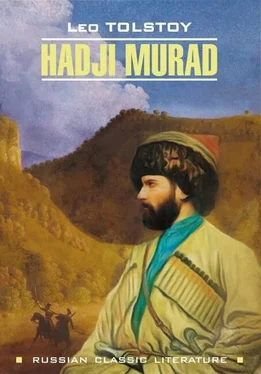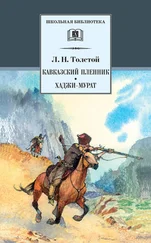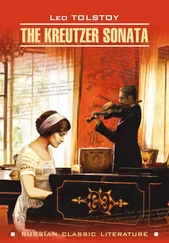“Yes, Imam.”
“You know what he has done?”
“I know, Imam, and am sorry for it.”
“Do you know how to write?”
“I was studying to be a mullah.”
“Then write to your father and say that if he returns to me now, before Bairam, I will pardon him and all will be as of old. But if he will not and remains with the Russians, then..,” – Shamil frowned menacingly – “I shall give your grandmother and mother to be used in the villages, and I shall cut off your head.”
Not a muscle twitched on Yusuf’s face. He bowed his head to signify he had understood what Shamil said.
“Write that and give it to my messenger.”
Shamil was then silent and took a long look at Yusuf.
“Write that I have decided to spare you. I will not kill you but will have your eyes put out, the same as I do to all traitors. Go.”
Yusuf appeared to be calm while in the presence of Shamil, but when he was led out of the guestroom he threw himself on his escort, snatched his dagger from its sheath and tried to kill himself But he was seized by the arms, bound and taken back to the pit.
That evening when the evening prayers were over and dusk fell, Shamil put on a white fur top-coat and passed through the fence into the part of the courtyard where his wives lived. He went straight to Aminet’s room. But Aminet was not there; she was with the older wives. Trying to keep out of sight, Shamil stood behind the door of her room to wait for her. But Aminet was angry with Shamil because he had given some silk to Zaidet and not to her. she saw him come out and go to look for her in her room and she deliberately did not return to her room. she stood a long time in Zaidet’s doorway, laughing quietly as she watched the white figure go in and out of her room. It was nearly time for the midnight prayers when Shamil, after waiting in vain, went back to his own quarters.
Hadji Murad had been a week at the fort living in the house of Ivan Matveevich. Although Marya Dmitrievna had quarreled with the shaggy-haired Khanefi (Hadji Murad had with him only two men: Khanefi and Eldar) and had several times ejected him from her kitchen – for which he nearly cut her throat – she evidently felt a particular respect and sympathetic concern for Hadji Murad. She no longer served him his dinner, a task she had passed on to Eldar, but she took every opportunity to see him and do anything she could to please him. she also took a very keen interest in the negotiations about his family; she knew how many wives he had, how many children and what ages they were, and each time a scout came she asked whom she could to discover how the negotiations were going.
In the course of this week Butler had become firm friends with Hadji Murad. Sometimes Hadji Murad would call on him in his room, at other times Butler would visit him. They sometimes conversed through an interpreter, otherwise they used their own resources – signs and, particularly, smiles. Hadji Murad had evidently taken a liking to Butler. This was clear from the way that Butler was treated by Eldar. Whenever Butler came into Hadji Murad’s room Eldar greeted him, flashing his teeth in a cheerful grin, hastened to put cushions on his seat and helped him off with his sword if he was wearing.
Butler also got on good terms with the shaggy-haired Khanefi, who was Hadji Murad’s sworn brother. Khanefi knew many songs of the mountains and sang them well. To please Butler Hadji Murad would summon Khanefi and tell him to sing, mentioning the songs he thought good. Khanefi had a high tenor voice and sang with great clarity and expression. There was one song Hadji Murad was particularly fond of and Butler was much struck by its solemn, sad refrain. Butler asked the interpreter to tell him the words in Russian and wrote it down.
The song was about vengeance – the vengeance that Khanefi and Hadji Murad had pledged to each other.
It went as follows:
“The earth will dry on my grave, and you, my own mother, will forget me. Grave grass will grow over the graveyard and will deaden your grief, my old father. The tears will dry in my sister’s eyes and sorrow will fly from her heart.
But you, my elder brother, will not forget me till you have avenged my death. You, my second brother, will not forget me till you lie by my side.
Bullet, you are hot and the bearer of death, but were you not my faithful slave? Black earth, you will cover me, but did I not trample you beneath my horse’s hoofs? Death, you are cold, but I was your master. The earth shall take my body, and heaven my soul.”
Hadji Murad always listened to this song with his eyes closed, and, as its last lingering note faded away, he would say in Russian:
“Good song, wise song.”
With the arrival of Hadji Murad and his close acquaintance with him and his murids, Butler was even more captivated by the poetry of the peculiar, vigorous life led by the mountaineers. He got himself a jacket, cherkeska and leggings, and he felt he was a mountaineer too, living the same life as these people.
On the day Hadji Murad was to leave Ivan Matveevich gathered a few of the officers to see him off. The officers were sitting at two tables, one for tea, dispensed by Marya Dmitrievna, and the other laid with vodka, chikhir and hors d’oeuvre, when Hadji Murad, armed and dressed for the road, came limping with quick, soft steps into the room.
Everyone rose and one after the other shook hands with him. Ivan Matveevich invited hem to sit on the ottoman, but Hadji Murad thanked him and sat on a chair by the window He was clearly not in the least put out by the silence which fell when he came in. He closely studied the faces of those present then fixed his eyes indifferently on the table with the samovar and food on it. Petrokovsky, one of the officers more spirited than the rest, who had not seen Hadji Murad before, asked him through the interpreter if he had liked Tiflis.
“Maya,” said Hadji Murad.
“He says he does,” the interpreter answered.
“What did he like in particular?”
Hadji Murad made some reply.
“He liked the theater best.”
“Did he enjoy the commander-in-chief’s ball?” Hadji Murad frowned.
“Every people has its own customs. Our women do not wear such clothes,” he said, glancing at Marya Dmitrievna.
“What didn’t he like?”
“We have a saying,” Hadji Murad said to the interpreter. “A dog asked a donkey to eat with him and gave him meat, the donkey asked the dog and gave him hay: they both went hungry.” He smiled. “Every people finds its own ways good.”
The conversation stopped there. The officers began drinking tea or eating. Hadji Murad took the glass of tea he was offered and put it in front of him.
“Now, would you like some cream? Perhaps a bun?” asked Marya Dmitrievna, serving him.
Hadji Murad inclined his head.
“Well, goodbye then,” said Butler, touching him on the knee. “When shall we meet again?”
“Goodbye, goodbye,” Hadji Murad said in Russian, smiling Kunak Bulur. “I your good kunak. Now time – off we go,” he said, tossing his head as if to show the direction he had to go. Eldar appeared in the doorway with something large and white over his shoulder and a sword in his hand. Hadji Murad beckoned him and Eldar with his long strides came over and gave him the white cloak and the sword. Hadji Murad took the cloak and, dropping it over his arm, gave it to Marya Dmitrievnas saying something for the interpreter to translate.
“He says: you admired the cloak – take it,” said the interpreter.
“But what for?” said Marya Dmitrievna, blushing.
“Must do. Adat tad it is the custom”, said Hadji Murad.
“Well, thank you,” said Marya Dmitrievna, taking the cloak. “God grant you may rescue your son. He is a fine boy ulan yakshi,” she added. “Tell him I hope he can rescue his family.”
Читать дальше
Конец ознакомительного отрывка
Купить книгу












